Otto von Habsburg
Otto von Habsburg, in Austria officially Otto Habsburg-Lothringen, usually abbreviated Otto Habsburg (born 20 November 1912 in Reichenau an der Rax, Lower Austria; † 4 July 2011 in Pöcking, Bavaria), was the eldest son of Charles I, the last Emperor of Austria and King of Hungary, as well as a writer, publicist and politician. He was a member of the European Parliament for the CSU from 1979 to 1999. He held the citizenships of Austria, Germany and Hungary and, after the independence of the state of Croatia in 1991, also Croatian citizenship, according to his own account.
From the mid-1930s Otto von Habsburg campaigned for European unification within the Pan-European Union - initially under Christian-monarchist auspices. In order to prevent the "Anschluss" of Austria to Hitler's Germany, he was prepared to go to extremes, as his correspondence with Chancellor Schuschnigg from February 1938 attests. He appeared as a staunch opponent of Hitler and National Socialism as well as Communism. An obituary stated, "In politics [...] he considered himself [...] 'an instrument of God.'"
Decades later, his stance on right-wing extremism and his statement on the influence of Jews in US politics were the cause of criticism and controversy. Similarly, his 2008 keynote speech at an ÖVP commemorative event (marking the 70th anniversary of the "Anschluss of Austria") in the Austrian parliament, in which he portrayed Austria as Hitler's first victim and claimed "that there is no state in Europe that has more right to call itself a victim!" was heavily criticized. He described himself as a "legitimist" (e.g., in a 2002 interview with the weekly Junge Freiheit), by which he meant someone "who advocates the legitimately acceptable form of government in the time in which that form of government exists."
In 1961, he signed the declaration of renunciation of sovereign claims required by the Habsburg Law as a condition for his entry into Austria. In the same year, however, his son was entered in the Pöcking baptismal register in Germany as Archduke. The uncertainty about his actual attitude towards the Republic gave rise to the "Habsburg Crisis". In 1966, after Federal Chancellor Josef Klaus had been able to form an ÖVP-alliance government for the first time since 1945, Otto Habsburg was again allowed to enter Austria legally. 1972 saw the "historic handshake" with the Social Democratic (SPÖ) Federal Chancellor Bruno Kreisky. Habsburg's political and historical statements repeatedly led to criticism and discussions in Austria until 2008, in which he had above all the Social Democrats as opponents.
Otto von Habsburg was co-initiator and patron of the "Pan-European Picnic" on 19 August 1989, and after the fall of the Iron Curtain in 1989/90 his personal contribution to these events was repeatedly acknowledged.
Private person Otto (von) Habsburg
Childhood
Otto was born in 1912 at the Villa Wartholz in Reichenau an der Rax in Lower Austria. As the first-born son of the then number two in the line of succession to the throne, the future Emperor Charles I, and his wife Zita, and as Crown Prince (from 1916), Archduke Otto was prepared for a future role as ruler. At the celebrations for the funeral of Emperor Franz Joseph I in Vienna and at his father's coronation as King of Hungary in Budapest, the four-year-old Otto made his first public appearance as Crown Prince in 1916.
From 1916, with the day his father Charles became Emperor of Austria and King of Hungary, until 3 April 1919, with the coming into force of the Law on the Abolition of the Nobility and the Habsburg Law, Otto was Crown Prince of Austria-Hungary. With all first names and full titulature, he was then referred to as His Imperial and Royal Highness Franz Joseph Otto Robert Maria Anton Karl Max Heinrich Sixtus Xaver Felix Renatus Ludwig Gaetan Pius Ignatius, Imperial Prince, Archduke of (to) Austria, Royal Prince of Hungary.
After the dissolution of the Austro-Hungarian Dual Monarchy at the end of the First World War, he lived with his parents in Eckartsau Castle in Lower Austria until March 1919 - before the former imperial family left the country in view of his father's impending internment. From 1919 to 1921 Otto Habsburg-Lothringen lived in exile with his parents in Switzerland.
After two failed attempts at restoration in Hungary, his father was exiled to Madeira by the victorious powers of the First World War; Zita accompanied him there and caught up with the children at the beginning of 1922. When Charles I lay on his deathbed in April 1922, the nine-year-old son had to watch how, in his father's words, "one dies as emperor and Christian". After Charles's death, the family moved to the Basque fishing village of Lequeitio, "where Alfonso XIII - the Spanish king had attended the Theresianum in Vienna and his mother was an archduchess - provided for the livelihood".
Youth and study
His mother raised her son Otto to be a Roman Catholic monarch even after the fall of the Dual Monarchy and the dethronement of the Habsburgs decided in Hungary in 1921. Thus he was taught the languages of the peoples of the imperial and royal monarchy. Monarchy and had to complete the old-Austrian and old-Hungarian timetable of a grammar school side by side. In addition to his native German, he was fluent in spoken and written Hungarian, Croatian, English, Spanish, French and Latin. He therefore later wrote his later books not only in German, but also in Hungarian and French.
In October 1929 the family settled in Belgium. The declaration of majority and thus the end of his mother's guardianship took place on 20 November 1930. Otto von Habsburg thus became head of the 'House of Habsburg' and sovereign of the Order of the Golden Fleece.
After passing his school-leaving examination with distinction, Otto von Habsburg took up studies in political and social sciences at the Catholic University of Louvain in October 1929 and assumed the Lorraine title of Duke of Bar. He was also enrolled under this name. As part of the work on his dissertation on Austrian agricultural questions, he completed a study visit with Max Sering at the Friedrich-Wilhelms University in Berlin. On 7 June 1935, after graduating with distinction, Otto von Habsburg was awarded the title of Doctor of Social and Political Sciences at the University of Louvain.
From 1940 and starting a family
From 1940 to 1944 Habsburg lived in the USA, from 1944 to 1951 mainly in France, and later again in Spain. In 1951 he married Regina Princess of Saxe-Meiningen in the Minorite Church in Nancy. Nancy was the historic capital of the Duchy of Lorraine and the Minorite Church was the burial place of his paternal ancestors, the Dukes of Lorraine. The marriage produced seven children (see below, Family members). Since 1954 Otto's immediate family lived in Pöcking on Lake Starnberg in Bavaria. The family-owned 'Villa Austria', which Otto von Habsburg lived in until his death, had been built by an Australian opera singer around 1870 as 'Villa Australia'.
After the Second World War Habsburg-Lothringen began to work as a lecture-tourist and was also active as a writer. Habsburg, who was supported in his political commitment by the Spanish dictator Franco, campaigned for the latter's award of the gold medal of Mariazell Abbey, which Franco received in 1952.
Family members
With his wife Regina von Habsburg (in Austria officially: Regina Habsburg-Lothringen, in short: Regina Habsburg; 1925-2010) he had seven children (of whom 22 are grandchildren and two great-grandchildren):
- Andrea Maria (* 30 May 1953 in Würzburg)
⚭ 1977 Karl Eugen Count von Neipperg
- Monika Maria Roberta Antonia Raphaela (* 13 September 1954 in Würzburg)
⚭ 1980 Luis María Gonzaga de Casanova-Cárdenas y Barón, Duke of Santangelo
- Michaela Maria Madeleine Kiliana (* 13 September 1954 in Würzburg)
⚭ 1984-1994 Eric Alba Teran d'Antin
⚭ 1994 Hubertus Count von Kageneck
- Gabriela Maria Charlotte Felicitas Elisabeth Antonia (* 14 October 1956 in Luxembourg)
1978-1997 Christian Meister
- Walburga Maria Franziska Helene Elisabeth (* 5 October 1958 in Berg am Starnberger See)
⚭ 1992 Archibald Count Douglas
- Karl Thomas Robert Maria Franziskus Georg Bahnam (* 11 January 1961 in Berg am Starnberger See)
⚭ 1993 Francesca Thyssen-Bornemisza
- Paul Georg Maria Joseph Dominikus (* 16 December 1964 in Berg am Starnberger See)
⚭ 1997 Eilika Duchess of Oldenburg
Family Head
With the declaration of his majority and thus the end of his mother's guardianship on 20 November 1930 until the end of 2006, Otto Habsburg was the head of the Habsburg-Lothringen families (and of the "House of Habsburg" which had ceased to exist in 1919). On 1 January 2007 he transferred this role to his son Karl Habsburg-Lothringen.
Waiver 1961
Entry into the Republic of Austria, which had been proclaimed on 12 November 1918, was prohibited to him and the other family members by Section 2 of the Habsburg Law of 3 April 1919, as long as they did not renounce their affiliation to the House of Habsburg-Lothringen and the claims to power derived from it and professed to be loyal citizens of the Republic. Otto made this declaration against the declared will of his mother in May 1961, in order to be able to enter Austria as a European politician, and signed with the name Otto Habsburg-Lothringen, which had been valid for him in Austria since the Law on the Abolition of the Nobility of 3 April 1919, but without the official hyphen between the two components of the name Habsburg and Lorraine (for details, see the section The "Habsburg Crisis" 1961-1966):
"To the Austrian Federal Government
Vienna I Ballhausplatz 2
I, the undersigned, hereby declare in accordance with § 2 of the Law of April 3, 1919, State Law Gazette for the State of German Austria No. 209, that I expressly renounce my membership in the House of Habsburg-Lothringen and all claims to power derived from it, and that I declare myself to be a faithful citizen of the Republic.
In witness whereof, I have signed this declaration in my own hand.
Pöcking, on 31 May 1961.
[Signed as "Otto Habsburg Lorraine."]"
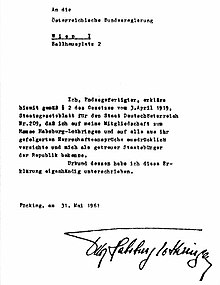
"To the Austrian Federal Government / Vienna I / Ballhausplatz 2" - waiver of 31 May 1961, signed Otto Habsburg Lothringen (without the official hyphen between the parts of the name Habsburg and Lothringen).
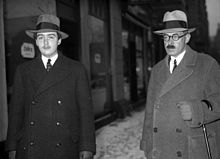
Otto von Habsburg (left) in Berlin with Count von Degenfeld (1933)
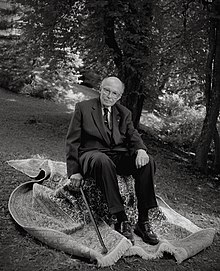
Otto von Habsburg portrayed by Oliver Mark, Pöcking 2006
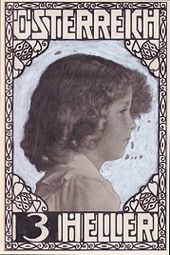
Stamp design with the portrait of Crown Prince Otto by Kolo Moser (1917)
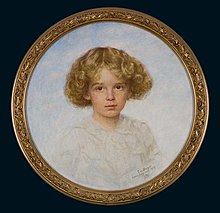
Tom von Dreger: Otto von Habsburg as Crown Prince of Austria-Hungary, Laxenburg Palace, 1917
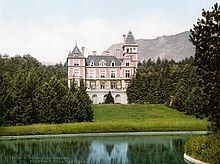
Birthplace Villa Wartholz (around 1900)
Political role
European politicians
From 1957 to 1973 he was Vice-President, and from 1973 to 2004, as successor to the founder Richard Nikolaus Graf von Coudenhove-Kalergi, President of the International Pan-European Union; from 2004 to 2011 he was its Honorary President.
From 1979 to 1999, after having acquired German citizenship in addition to Austrian citizenship in 1978, he was a Member of the European Parliament for the Christian Social Union in Bavaria (CSU) and twice its oldest member. Otto von Habsburg had been a member since 1982, but had not assumed any party offices.
In connection with the drafting of the European Constitution, he was always in favour of a reference to God. In the European People's Party, he was Chairman of the Political Affairs Committee from 1981 to 1999, Chairman of the Delegation to the EU-Hungary Joint Parliamentary Committee, a member of the Political Affairs Committee on Legal Affairs and Citizens' Rights and a substitute member of the Committee on Development and the Committee on Budgetary Control.
Otto von Habsburg retired from the European Parliament at his own request on 13 June 1999 for health reasons. After retiring from all political functions and relinquishing many of his offices, he worked in the end only as a publicist.
claims to the throne and title
Brought up in this way from time immemorial by his mother Zita, Otto Habsburg-Lothringen clung for decades to the claims to the throne that had passed to him in the spirit of legitimism after the death of his father. In the following successor states of Austria-Hungary, claims to the throne by the House of Habsburg were explicitly excluded by law:
- German Austria abolished the monarchy on 12 November 1918 and the titles of nobility on 3 April 1919; see Federal Constitution (Austria) and Adelsaufhebungsgesetz.
- The Czechoslovak Republic, founded on 28 October 1918, abolished the titles of nobility on 10 December 1918.
- Hungary remained a monarchy until 1946, but in 1921, after two attempts at restoration by Charles IV, at the request of the Triple Entente, Hungary passed the Dethronement Act, which deposed the king and excluded his descendants from the throne. Law IV/1947 of 14 January 1947 abolished the nobility and the titles of nobility.
The provision cited in Emperor Franz I's imperial proclamation of 11 August 1804, according to which the head of the House of Austria would bear the title of emperor irrespective of the constitution of the hereditary lands, was no longer politically significant after the fall of the monarchy in 1918, since the Empire of Austria as a state ceased to exist after Emperor Karl's declaration of renunciation and the proclamation of the Republic in November 1918.
As a citizen of the newly founded Republic of German Austria (1918/1919) or the Republic of Austria (since 1919), which had come into being after the dissolution of the Danube Monarchy at the end of the First World War, Otto von Habsburg fell under the Law on the Abolition of the Nobility (in conjunction with the Habsburg Law) passed by the National Assembly on 3 April 1919, by which the dynastic house name Habsburg-Lothringen was civilized in Austria and became a family name.
In 1957, the Austrian Ministry of the Interior recorded that Otto's name was officially Dr. Otto Habsburg-Lothringen. At the same time, he was officially prohibited from using the dynastic name Otto of Austria on the basis of the Law on the Abolition of the Nobility. In a 2011 obituary in Die Zeit, Joachim Riedl referred to Otto Habsburg's long "list of titles that are of melodious worthlessness."
Interwar
Plans in Austria
Since about 1922 smaller traditionalist associations had emerged in Austria, for example in Vienna "Ö. StV. Ottonia" (formerly Corps Ottonen), who wanted to establish a constitutional monarchy with the Habsburg prince at its head. However, this restoration movement (see Legitimists) was approved by only a few politicians. In all free elections of the First Republic, parties with a monarchist orientation received only a small number of voters, and always failed to enter parliament.
Especially from 1930 onwards, individual politicians in Austria, including the Federal Chancellors Engelbert Dollfuß and Kurt Schuschnigg, who ruled dictatorially from 1933 onwards, considered appointing the son of the last emperor as head of state in a newly constituted monarchy. This was intended to overcome the struggles between the political camps. With the return to the imperial and royal monarchy. Monarchy was intended to strengthen the Austrians' sense of statehood and create a counterweight to the German nationalist efforts to join the German Reich.
In the course of the return to the past, the Ständestaat also reintroduced the double-headed eagle in the national coat of arms in 1934 (albeit without the crown and sceptre) and emphasised the k.u.k. tradition in the Federal Army, for example by partially reintroducing old army uniforms. Tradition was emphasized, for example by the partial reintroduction of old army uniforms. Otto von Habsburg was, however, requested several times by Chancellor Schuschnigg not to enter Austria, so as not to give other states a reason to attack.
On 10 July 1935, Schuschnigg legally repealed the Habsburgs' expulsion from the country and the confiscation of their private property. In April 1936 the Family Provident Fund was restored. At the beginning of 1937, after a meeting between Habsburg and Schuschnigg, a protocol for the preparation of the restoration is said to have been drawn up. On 1 January 1938, goods worth about 31.5 million shillings (value April 2011: about 103 million euros) were restituted in favour of this fund. Otto Habsburg is said to have received a monthly appanage of 20,000 shillings. In 1937, however, a cooling of Schuschnigg's relationship with Otto occurred, and Schuschnigg "postponed" considerations of re-founding the monarchy.
Until the Anschluss of Austria to Hitler's Germany in 1938, the "emigrant" Otto Habsburg had been granted honorary citizenship by 1603 Austrian municipalities. He had received the first honorary citizenship in the municipality of Ampass in Tyrol on 7 December 1931, and other municipalities had followed this example. On 11 February 1938 there were monarchist mass meetings with about 80,000 participants in Vienna and in the provincial capitals.
Will to defend against Hitler
Shortly before the "Anschluss" of Austria to the National Socialist German Reich, Otto von Habsburg asked the then Chancellor Schuschnigg to give him the chancellorship of the Republic in order to organize military resistance. While Schuschnigg wanted to protest against a possible German invasion and capitulate, Habsburg, like parts of the Austrian army and army leadership at the time (other parts had long been National Socialists), was in favour of military resistance and wanted Schuschnigg to take over the reins of government.
In his letter of 17 February 1938 to Schuschnigg, Habsburg demanded not only active defense and strict rejection of National Socialism:
"For the time being, pacification to the left must be actively pursued. The workers have proved in recent days that they are patriots. This group cannot be poisoned by National Socialism, will therefore always stand up most surely for Austria, whereas the Government must give it the opportunity to take an active part in the shaping of the fatherland - for which it is prepared to stand up."
Schuschnigg rejected this request; such an attempt would "with one hundred percent certainty mean the downfall of Austria".
Adolf Hitler, Hungary and Czechoslovakia (Czech politicians, according to the Sudeten German Association, issued the slogan "Rather Hitler than Habsburg!") responded to the restoration intentions in Austria with invasion plans (the German invasion plan was cloaked in the name "Otto Enterprise", but possibly with reference to the Ottonians), as they feared monarchist repercussions in their countries.
Europe
In the 1930s Habsburg met Richard Coudenhove-Kalergi, who had founded the Paneuropa Union (PEU) in 1922. In 1936 he became a member. After World War II, Habsburg succeeded Coudenhove-Kalergi as president of the Union from 1973 to 2004 and then served as honorary president until his death in 2011. In Austria, he was involved in the transformation of the Monarchist Movement into the Pan-European Movement Austria and became its president until 1986, when he handed over the function to his son Karl.
Nazi period
Transactions in continental Europe
After the Anschluss to the German Reich marked the beginning of Nazi rule in Austria, Habsburg was put on the wanted list for high treason on 29 March 1938, as reported by the Völkischer Beobachter on 20 April, the "Führer's birthday". His personal assets and those of the Habsburg family, which he managed, were expropriated on Hitler's personal orders. The top leaders of the legitimist movement were immediately arrested and largely executed. Between 1938 and 1942, 4000 to 4500 Austrian monarchists were probably arrested; about 800 to 1000 of them were executed or murdered in concentration camps.
On 10 May 1940, the Habsburg family narrowly escaped a bombardment of Steenokkerzeel Castle. The Fuehrer's deputy Rudolf Hess ordered the invading troops in Belgium to shoot Otto Habsburg and his brothers immediately without trial if they were caught. Via Paris, Spain and Portugal (he obtained the necessary visa from Aristides de Sousa Mendes), "Otto of Austria", as he then called himself in America, fled into exile in the United States (USA) on 27 June 1940. His mother Zita, and Otto's siblings also fled to the Americas. In the early 1940s, he met the emigrant Fritz G. A. Kraemer in the Library of Congress, who became an influential advisor in the US Department of Defense after 1948.
On the day of the radio call for an armistice by Philippe Pétain in France, Habsburg returned once again to Bordeaux on 17 June 1940, according to an authorised biography, in order to organise visas for the escape of Austrians who had been politically persecuted in the German Reich via Spain and Portugal to overseas with the help of the Portuguese Consul General, Aristides de Sousa Mendes. The biography speaks of about 15,000 people who were saved in this way. The ORF documentary "Menschen und Mächte" (People and Powers) broadcast on the occasion of his death also speaks of thousands of rescued visas that he would have organized for Austrians who had to flee the German Reich and the occupied countries. His name is said to have already been on a so-called "Wiesbaden List" of persons whom France would have had to arrest immediately and extradite to the German Reich in the event of unconditional surrender.
Otto Habsburg, his mother and his siblings were deprived of their Reich citizenship on Hitler's orders. A secret file of the Reich Security Main Office in Berlin dated 25 August 1941 states:
"The Fuehrer has ordered, after presentation, that the former Empress Zita of Habsburg-Lothringen be deprived of German citizenship and that denaturalization be extended at the same time to her sons and daughters, confiscating their property, some of which has not yet been confiscated."
The expropriated property fell to the Greater German Reich and, insofar as it was located in Austria, passed into the possession of the Republic of Austria after its demise.
The credit claimed by Habsburg for having prevented or postponed Allied air raids on Austria (in the German Empire the "Donau- und Alpenreichsgaue" were called "Reichsluftschutzkeller") is not accepted by scholars. The initial non-bombing was due to the fact that the bases of the British and American air forces, from which the bomber squadrons took off, were initially too far away from Austria to guarantee the safe return of the planes. Only when the bases came closer to Austria in 1943/44 (Foggia airport) or when US bombers with a longer range became available, bombing operations were started.
Actions in the USA and Great Britain
In the USA and Great Britain Otto Habsburg had intensive personal contacts with President Franklin Roosevelt and Winston Churchill. He successfully initiated the "Austrian Day", the successful inclusion of Austria in the stamp series "Occupied Nations" and, above all, his participation in the 2nd Quebec Conference, where, with Churchill's support, he successfully suggested to President Roosevelt a reduction of the Soviet zone or the division of Vienna among the four Allies. His attempt to form a government-in-exile and a Habsburg "Austrian Battalion" failed, however.
Otto Habsburg's efforts were intended to achieve Austria's state independence after the war, to change the Allies' zoning plans in occupied post-war Austria in favour of the Western powers, and to break Hungary out of the alliance with the German Reich. With regard to Hungary, Western Allied plans for a Hungarian surrender to the Western powers, an air landing of Allied troops in Hungary or landing in Yugoslavia in support, and an intended installation of Otto von Habsburg as part of or at the head of the Hungarian government were frustrated by the surprise occupation of Hungary by the Red Army. Churchill was a proponent of these plans to halt the imminent Soviet advance into Central Europe.
Another realistic restoration possibility for Habsburg existed during the Second World War, in that he won Churchill over to the concept of a Danube federation, or Habsburg was led in plans by British diplomacy for such considerations: On the territory of the former Austro-Hungarian Empire, according to his ideas, a new multi-ethnic state of Austria-Hungary was to be created on the model of Belgium, uniting two large population groups. The states of Bavaria, Baden, Württemberg and Hohenzollern-Sigmaringen were also to be restored as monarchies and united in a so-called "South German Confederation". There was also a proposal by Churchill to isolate Prussia and create an enlarged Danube League. "When Bruno Kreisky learned of this in exile in Sweden, he noted, "Does one really believe in these circles that the feelings of hatred which were connected with the name Habsburg have already disappeared today?""
Churchill wanted to create a modernized edition of the old Austria-Hungary as a counterweight to the German Empire, saying of the latter: "If it did not exist, it would have to be invented." (This bon mot is originally attributed to the Czech historian and politician František Palacký, 1798-1876). Churchill's concepts in this regard, however, failed due to rejection by Josef Stalin at the Tehran Conference. Roosevelt considered the realistic chance of implementing this project to be small due to the far advance of the Red Army and therefore did not advocate this project in the same way as Churchill. However, the Americans and the British did not associate this federation with the goal of re-enthroning the House of Habsburg.
In a private conversation between Archbishop of New York Francis Spellman and President Roosevelt on September 3, 1943, the President answered Spellman's explicit question as to whether Austria, Hungary, and Croatia would fall under any kind of Russian protectorate with an unequivocal yes. On Austria, Roosevelt said there would be no opposition to a Communist-controlled Austrian regime. The only possibility would be if Otto von Habsburg could win the throne with the help of Hungary - but even he would have to come to terms with the Russians.
From 1944 until the renunciation in 1961
In November 1944, Otto von Habsburg was 'one of the first refugees' to travel from the USA via Lisbon to liberated Paris, and in 1945, after the end of the war, to western Austria; he stayed for a few weeks in the French zone, in Innsbruck, with his brother Robert.
In a letter signed "Otto of Austria" and decorated with the Habsburg crown, Otto wrote to U.S. President Truman on July 2, 1945, recommending the creation of Austrian government offices in the provinces occupied by the Western Allies and warning against recognition of the provisional state government headed by the Social Democrat Karl Renner in Vienna, "since otherwise 'the Communist-dominated regime' in Vienna would 'lead the country to anarchy.'" This Habsburg proposal was not followed, as it would have solidified the division of Austria along the demarcation line with the Soviet zone. Renner succeeded in obtaining the recognition of all four Allies for his government in Vienna as late as 1945.
The return of the Second Republic to its pre-1933 constitutional status (including the Habsburg Law), which was still decided in 1945, forced Otto Habsburg to leave Austria again in 1946: "At the urging of the American occupying power, Foreign Minister Karl Gruber finally travels to Tyrol to persuade the troublesome Habsburgs to leave."
Habsburg had to leave the country because he had not submitted a declaration of renunciation. The Socialists were still suspicious of Habsburg for decades; they were by no means in favour of his entry. Moreover, despite resistance from the French, the departure was probably necessary to appease the Soviets, who wanted to prevent a Habsburg renaissance in their sphere of influence and therefore also demanded that the validity of the Habsburg Law be enshrined in international law in 1955 in order to approve the Austrian State Treaty.
The expulsion in 1946 had no effect on Otto Habsburg's Austrian citizenship. As he did not have a valid Austrian passport, he received a Monegasque passport or a passport of the Sovereign Order of Malta, to which he had belonged since 1932, through Charles de Gaulle. Later he also received a Spanish diplomatic passport. In 1949 Otto Habsburg elevated "in contradiction to the Austrian constitution a number of persons to the peerage". In an interview with a Viennese daily newspaper shortly afterwards, Habsburg advocated "a form of state consisting of a mixture of monarchical and republican elements".
Since 10 May 1954, the permanent residence of the Habsburg-Lothringen family has been the "Villa Austria" (popularly known as the "Kaiservilla") in Pöcking on Lake Starnberg. In 1957 the Austrian Ministry of the Interior established the name with Dr. Otto Habsburg-Lothringen, at the same time he was officially forbidden to use the dynastic name Otto of Austria. Previously, Habsburg had attempted to have his daughters Andrea and Gabriela registered in their places of birth with names that referred to the former dynastic function of his family. In the case of Andrea, his attempt to have her registered as Archduchess in 1953 in Würzburg, where three of his children were born at the University Women's Hospital there, failed; in the case of Gabriela, he succeeded in 1956 in Luxembourg.
On 8 May 1956, Otto Habsburg-Lothringen had been certified by the Lower Austrian provincial government to be an Austrian citizen and was issued a passport. However, this passport contained the restriction "Valid for all states of the world, with the exception of Austria" (cf. Citizenship of Karl).
At the beginning of 1958, Maximilian Hohenberg, a son of the heir to the throne Franz Ferdinand, who had been murdered in Sarajevo, felt in Austria about Otto Habsburg's chances of return, but the Socialists had shown themselves reserved. The basis for this was the declaration drawn up by Otto's lawyer on 21 February 1958, the sole purpose of which was the possibility of return, but without explicit recognition of the Habsburg Law and without formally renouncing any claim to power - as demanded by the SPÖ:
"In order to be able to return to my homeland, I declare in my own name and in the name of my spouse and my minor children, as an Austrian citizen, to recognize the laws currently in force in Austria and to profess myself a faithful citizen of the Republic."
On September 3, 1958, he wrote to Chancellor Julius Raab, to whom he deposited his wish to return. Raab replied to him on October 17, expressing in the letter his concern "that with the sensitivities of Czechoslovakia and Hungary it will be impossible to engage in political activity here in Austria." In addition, he raised the demand for restitution of the former Habsburg assets from the so-called Family Provident Fund.
Shortly thereafter he again declared, to the Neue Kurier, that in his eyes the constitutional form of government was the best form of government. On 20 December 1958, he was quoted by the French magazine Paris Match, a statement he later denied having made in this form:
"But once I have returned and become an ordinary citizen, who shall prevent me from fighting politically for my ideas, and what law could then prevent the citizens of the state from electing me emperor?"
Also in 1958, according to a Spiegel report, von Habsburg called for an authority for Europe that could protect the general interest against the special interests of individuals. Such an authority had previously been the emperor. Neither the former League of Nations nor the UN had been able to solve this task. The European flag was more reminiscent of the emblem of a department store, which could never replace the cross under which Europe had come into being and under which alone it could live.
All this seemed unacceptable to the SPÖ and aroused opposition. The Federal President Adolf Schärf then wrote to the (then) Secretary of State Bruno Kreisky at the beginning of January: "The Habsburg question keeps intruding. If one considers that at the same time Otto is declaring in Austria the opposite of what he is saying in France, then one must reckon that he would only use his return to begin the Restoration. [...] For this reason I believe that everything should be done to make a return more difficult."
At the suggestion of the Spanish ministerial advisor Sánchez Bello, Habsburg was to be brought into the conversation for the Spanish crown after Franco's death, but this was never really an option for the dictator.
The "Habsburg Crisis" 1961-1966
From 1961 onwards, the coalition of ÖVP and SPÖ got into a serious crisis over the issue of Habsburg ("Habsburg Crisis"), with which fundamental constitutional questions were connected. As a consequence, there were internal political disputes about Otto Habsburg's possible return, which were to continue even after an officially recorded declaration of renunciation, dated 31 May 1961. With a time lag of more than forty years, the Parliamentary Correspondence (hereinafter abbreviated as PK), as the media office of the Parliament, published a detailed account of this in 2006, which is the basis of the following summary:
Assets
Initially, the domestic political Habsburg crisis was only ignited by the property issue. While the ÖVP-led Federal Chancellery commissioned an investigation into which properties could have been restituted and held talks with the Federal Forestry Office in this regard, and Chancellor Raab commissioned his department to prepare a draft law on the restitution of the Habsburg property, the SPÖ, on the other hand, blocked the process and attacked Otto Habsburg in the media. The latter, in turn, now realized that he would not be able to assert himself on the property issue and limited himself only to making his entry into Austria possible. The journalist Hellmut Andics suspected that Habsburg might also have realized "that for him as head of the family, not only rights but also obligations towards the other family members would result from the reactivation of the family provident fund."
Titles for Habsburg children
Only a few months before his declaration of renunciation at the end of May 1961 (also known as the "declaration of loyalty"), Otto Habsburg had had his newborn son Karl (born 11 January 1961) entered in the Pöcking baptismal register as "Karl von Habsburg, Archduke of Austria, Royal Prince of Hungary". Habsburg explained the process in a Spiegel interview in 1965:
"This whole story went like this: The local priest made the entry without asking me, on his own initiative. It is, after all, his book. By the way, he did not refer to my son as the heir to the throne. The priest also reported the facts in a registered letter to the SPÖ press, which wrote about the entry. But they never published his letter."
According to an APA press release of the Hungarian "official party" daily newspaper Népszabadság of 5 June 1963, he had already obtained such a registration (and probably for all children born before Karl) for his eldest daughter Andrea Maria (born 30 May 1953):
"the civil registry office of pöcking carefully preserves the entry according to which otto von habsburg's daughter, andrea maria, archduchess of austria, is baptized royal princess of hungary. in hungary you will certainly not find a sensible person who takes the title royal princess seriously."
At the same time, the party organ feared:
"his emphatic pose is based on encouragement from very real forces. reactionary circles inside and outside austria are active and intend, with the return of otto von habsburg, the incipient liquidation of the foundations of the bourgeois-democratic regime in austria itself, the abrogation of the state treaty, the liquidation of austria's neutrality and its integration into the western military alliance."
Go on:
"we hungarians cannot ignore this new habsburg provocation. we cannot forget that ..... otto habsburg, albeit disguised as a 'commoner', is in his innermost mind thinking of crossing the austrian border as +emperor of austria and king of hungary+."
Waiver of 31 May 1961
Political assessment
Otto Habsburg-Lothringen announced in a declaration "To the Austrian Federal Government", dated "Pöcking, 31 May 1961", handed over to Federal Chancellor Alfons Gorbach by his lawyer, the former Minister of Finance Ludwig Draxler, on 5 June 1961, that he expressly renounced his membership in the House of Habsburg-Lothringen and all claims to power derived from it and that he declared himself to be a loyal citizen of the Republic (see exact wording above).
This wording thus corresponded in its essential parts verbatim to para. 2 of the Habsburg Law. At the same time, he requested the Government, in agreement with the Main Committee of the National Council, to determine that this declaration was to be considered sufficient to lift the expulsion imposed on him by the Habsburg Law in 1919.
No agreement could be reached on this in the Council of Ministers on 13 and 21 June 1961. The minutes of the meeting were supplemented a few days later by the addition that the motion was thus deemed to have been rejected. The application was therefore not forwarded to the Main Committee of the National Council. The applicant was also not notified.
Legal assessment
Otto Habsburg-Lothringen then appealed to the Constitutional Court, which, however, declared itself incompetent on 16 December 1961. The Supreme Court justified its position by stating that no decision had been issued and that the Government had to seek agreement with the Main Committee, which in turn was not an administrative body and whose members had the constitutionally guaranteed free mandate. The Constitutional Court therefore had no decision-making competence.
Therefore, on 6 February 1962, Habsburg turned to the Administrative Court with a complaint of default (i.e. a complaint that no decision had been taken on his application). The latter requested the Government to either issue a statement or to take a decision. After the government had also failed to meet this deadline, the Administrative Court (which was entitled to decide in the place of the competent bodies in the case of default complaints until the introduction of comprehensive administrative jurisdiction in 2014) found on 24 May 1963 that the declaration of loyalty was sufficient (which ended Otto Habsburg-Lothringen's expulsion from the country in accordance with the law). The Administrative Court assumed that the right of Parliament to participate in this decision had been established in the Habsburg Law of 1919, but had not been transferred to the Federal Constitution of 1920, and that it could therefore decide on its own in place of the defaulting Federal Government.
Political aftermath
Political debate
This Administrative Court decision sparked a very controversial public debate. There were strikes and demonstrations against Habsburg, also with the participation of the trade union federation. In the parliamentary debate, in turn, it was above all the constitutional and constitutional aspects that were hotly debated. In particular, the different ruling practices of the two supreme courts aroused serious constitutional concerns.
On 5 June 1963, an urgent question from the SPÖ to the Federal Chancellor "concerning the preservation of legal unity in Austria" was debated in the National Council. The SPÖ objected, among other things, to the fact that the Administrative Court, by its ruling, had ignored Parliament's right to participate in this decision. (SPÖ Vice-Chancellor Bruno Pittermann spoke of a "judicial putsch" at the party conference in Vienna on 6 June 1963). The ÖVP took the view that the declaration made by Otto Habsburg-Lothringen fully complied with the legal requirements and was to be accepted. The FPÖ supported the SPÖ's view that the National Council had been illegally bypassed by the Administrative Court. At their request, the National Council adopted a resolution, with the votes of the SPÖ and the FPÖ, that the Federal Government should submit a bill to Parliament in order to avoid conflicting decisions of the supreme courts in the future. In addition, an authentic interpretation of the Habsburg Law is demanded so that the rights of the Main Committee are not diminished in the future.
Federal Constitutional Law "Authentic Interpretation
On the basis of this resolution, the ÖVP-SPÖ federal government Gorbach II submitted a federal constitutional law to this effect. It was passed unanimously on 4 July 1963 in a very turbulent National Council session after heated discussions. It affirmed that the determination of whether a declaration under the Habsburg Law was to be recognized as sufficient was the responsibility of the Federal Government in agreement with the Main Committee of the National Council.
Resolution of the National Council
However, since the law could not be passed retroactively, as the SPÖ wanted, and therefore could not overrule the decision of the Administrative Court of 24 May 1963 in favour of Otto Habsburg-Lothringen. Since, however, the law could not be passed retroactively, as the SPÖ wanted, and therefore could not repeal the decision of the Administrative Court of 24 May 1963 in favour of Otto Habsburg-Lothringen, and since the ÖVP rejected the proposal of the SPÖ to subject the Administrative Court decision to a referendum on the grounds of unconstitutionality, the National Council further adopted, with an SPÖ-FPÖ majority, a resolution addressed to the Federal Government concerning the "declaration of the will of the people's representation for a return of Dr. Otto Habsburg-Lothringen". In it "the Federal Government is 'instructed', 'in appreciation of the fact that ... a return of Dr. Otto Habsburg-Lothringen to Austria is not desired, because it would undoubtedly be connected with serious consequences for the Republic of Austria and would also lead to economic setbacks because of the danger of political conflicts arising from it', to comply with this statement in an appropriate manner as a declaration of the will of the Austrian people's representation". (PK).
The Austrian People's Party (ÖVP), on the other hand, had argued that the resolution was nothing more than an order to the government to ignore the legal force of a Supreme Court decision. It was countered that the Federal Government was requested to comply with the declaration of intent in an "appropriate manner", so that unconstitutional and illegal measures were ruled out from the outset. The Austrian People's Party (ÖVP) rejected the idea, expressed by the SPÖ in the discussion, that an individual case decision by the government and the main committee as a political matter would take place "in a court-free area" and therefore could not be reviewed by the highest courts, as being incompatible with the rule of law.
In return, an SPÖ speaker pointed out that the Christian Socialist mayor of Vienna, Karl Lueger, had already organized mass rallies in 1899 against an Administrative Court decision that was not approved by his party. Furthermore, it was pointed out that the legal literature since 1920 had nowhere mentioned the legal opinion that the Main Committee was not competent. In interjections, the two governing parties accused each other of incidents from 1927 (Palace of Justice fire after editorial in the Arbeiter-Zeitung), 1933/1934 (elimination of democracy by the predecessor party of the ÖVP) and 1950 (alleged passivity of the ÖVP in the communist-led October strikes) as well as their respective thoughts on coalition with the FPÖ.
Follow
For the time being, Otto Habsburg-Lothringen was still not allowed to enter the country. This was because the Minister of the Interior, Franz Olah, and the Foreign Minister (and later Federal Chancellor), Bruno Kreisky, had (allegedly as early as 24 May 1963, the day of the Administrative Court ruling) given the instruction not to issue a passport to Habsburg, who did not possess an Austrian passport but a Spanish diplomatic passport, and thus to prevent his entry. False alarms at border stations are said to have led to several operations by the executive.
In 1964, the ÖVP and the SPÖ agreed to solve the Habsburg question "together in a peaceful manner and in the long term, while respecting the constitution and every rule of law", as stated in the government declaration of 2 April 1964. It was also agreed to refrain from hasty steps, which meant that an entry of Otto Habsburg-Lothringen was no longer under discussion until the end of the legislative period. "Nor does Bruno Kreisky's Solomonic proposal to deport Otto Habsburg as Austria's representative to the Holy See meet with approval."
End of the crisis: entry permit 1966
Only the National Council elections of 1966, from which the ÖVP emerged with an absolute majority, brought about a turning point in the Habsburg question and ended the crisis. Under the ÖVP-alliance government Klaus, the Ministry of the Interior issued Otto Habsburg-Lothringen an unrestricted passport on 1 June 1966. Two subsequent SPÖ motions for resolutions, tabled by MP Leopold Gratz (later Federal Minister, Mayor of Vienna, President of the National Council) on 8 June 1966 in the context of an urgent question, which aimed on the one hand to "reaffirm the resolution of 1963" and on the other hand to "continue to preserve the Habsburg assets 'undiminished for the Austrian people'" (PK), were rejected with the votes of the ÖVP and FPÖ. However, a majority of the ÖVP and the FPÖ did vote in favour of the FPÖ motion for resolution, in which the Federal Government was requested to ensure that in the case of "any claims of Dr. Otto Habsburg-Lothringen or of other members of the House of Habsburg-Lothringen which may be pending or which may still be asserted, that these are decided exclusively by the competent courts of the Republic of Austria on the basis of the law". This marked the end of the parliamentary treatment of the Loyalty Declaration.
Der Spiegel wrote in June 1966:
"In order to avoid red uproar, however, ÖVP Chancellor Klaus took the Habsburg's promise to cautiously savour the new feeling of home: through fleeting flying visits in a simple loden coat, Otto is to convince the people of the Republic of his harmlessness and slowly get used to the sight of him. For the time being, the residence of the Habsburg family - in addition to Otto, wife Regina of Saxe-Meiningen and seven children - is to remain Pöcking in Bavaria."
Otto Habsburg-Lothringen entered Austria for the first time on 31 October 1966, which led to protests and a strike by some 250,000 workers on 2 November.
Norbert Leser, a Social Democrat and political scientist, argued decades later that the Social Democrats and he himself, as a Habsburg cannibal, were not afraid of a monarchist restoration at the time, but feared being pushed into the background by Otto Habsburg-Lothringen. This conflict had mainly been used to divert attention from problems within the party (the expulsion of Franz Olah). In his opinion, the SPÖ party conference in 1963 was dominated by the defence against the imagined danger of Otto Habsburg, whereby according to Leser, Justice Minister Christian Broda had played a leading role in this respect.
Since the 1970s
On 4 May 1972, on the occasion of the 50th anniversary of the Pan-European Union in Vienna, there was a "historic handshake" between Otto Habsburg-Lothringen and Federal Chancellor Bruno Kreisky. From then on, Otto Habsburg-Lothringen's visits to Austria were no longer discussed, and relations between Austrian Social Democracy and the Habsburg family relaxed.
In his European Information Center in Madrid, founded "under the wing of his old friend", the Spanish dictator Franco, an "elite circle" that sought "European unification under Christian auspices", Habsburg had met the top Bavarian politician Franz Josef Strauß, "his later mentor" from 1970. "The bearer of a famous name spans a worldwide network of relationships, but he avoids the aristocratic rainbow world. "Futile," he says, is his station. He means futile."
On June 8, 1978, Habsburg-Lothringen - bearing the name Otto von Habsburg in Germany - received his German passport, and with it German citizenship, at the town hall of his home in Pöcking. Habsburg "moves through the Cold War as an anti-communist itinerant preacher, especially demonizing Willy Brandt's Ostpolitik." In the 1979 European election, Strauß helped him to a CSU mandate in the European Parliament, of which he was a member until the 1999 European election. There he was, among other things, foreign policy spokesman for the EPP parliamentary group and, against great opposition, initiated the resolution that drew attention to the peoples behind the Iron Curtain by means of an empty chair in the European Parliament. On 13 July 1988 Otto von Habsburg travelled to Budapest in still communist Hungary for the first time since 1918.
He was co-initiator and patron of the "Pan-European Picnic" on 19 August 1989 at the Hungarian-Austrian border, where Hungary had begun dismantling the Iron Curtain in May 1989. A gate that still existed was symbolically opened for three hours during the picnic. 661 GDR citizens vacationing or waiting in Hungary (who had been made aware of the event by word of mouth by the organizers) took advantage of this historic moment to leave the country unchecked and unhindered by the Hungarian border guards in the direction of Austria. After the Pan-European Picnic, Erich Honecker dictated the following statement to the Daily Mirror: 'Habsburg distributed leaflets far into Poland inviting East German holidaymakers to a picnic. Then when they came to the picnic they were given presents, food and German marks, then persuaded to come to the West." "After his fall ... Honecker claimed that this Habsburg had hammered the coffin nail into his coffin."
Otto von Habsburg was one of the signatories of the declaration "For freedom and self-determination - against totalitarian aspirations of lesbian and gay associations", which was launched in spring 2009 in support of the 6th International Congress on Psychiatry and Pastoral Care. He justified his signature by saying, "For me, this is a matter of principle and courage to profess and stand up for values. Too often the courage to profess is lacking. If you have the courage to oppose a despot like Hitler, you don't need courage to oppose the spirit of the age today either."
Criticism and controversy
At the end of 1998 Habsburg came under fire from critics and the Munich public prosecutor's office because he compared the accusations and demands for resignation against his son Karl Habsburg in connection with the World Vision donations affair to the National Socialist persecution of Jews:
"Karl is attacked because he wears the certain yellow star, the name Habsburg. [...] The poor Jews have been through terrible things. I often think of them in this context."
Karl Habsburg's EU election campaign for the Austrian People's Party (ÖVP) had been financed in 1996 - according to Habsburg without his knowledge - in part with embezzled donations from the aid organization World Vision Austria, which had been diverted to the Pan-European Union.
Habsburg's public support for the weekly newspaper Junge Freiheit, which belongs to the New Right and to which he repeatedly made himself available as an interview partner, met with criticism. As the first signatory of two petitions initiated by the editorial staff, he campaigned against the newspaper's categorisation as "right-wing extremist" in 2002 against the background of a legal dispute and against its exclusion from the Leipzig Book Fair in 2006.
In 2002, in an interview with Junge Freiheit, Habsburg stated, when asked what he saw as the reason for the "unusually militant tones" before the threatened US intervention in Iraq, that US domestic policy was divided into two halves, namely a Department of Defense "staffed with Jews in key positions", "today a Jewish institution", on the one hand, and a State Department staffed by "blacks, for example Colin Powell and Condoleezza Rice", on the other. In contrast, according to Habsburg, the "Anglo-Saxons, i.e. the white Americans" played "hardly any role".
In November 2007 Habsburg commented on his attitude towards Engelbert Dollfuss' coup d'état. He had respected Dollfuss "immensely. The man was brave, ready to stand up for Austria to the last consequence. At that time I saw everything from this perspective: We must preserve Austria." He also had "no" problem at all with the dissolution of parliament and the banning of parties and trade unions: "When it comes to the country, I am ready for any cause. “
On the occasion of a ceremony of the Austrian People's Party (ÖVP) in Vienna in March 2008 to commemorate the National Socialist takeover of Austria in March 1938, there was a scandal over Otto von Habsburg's statement that Austria had been Hitler's "first victim". No state in Europe had more right than Austria to call itself a victim. The "real scandal" was the discussion about whether Austria had been complicit in the crimes of the Nazi regime or had been its victim. In this context, he called the Moscow Declaration of the Allies of 1943, which established Austria's co-responsibility, "one of the greatest acts of hypocrisy and lying", since Austria had long since disappeared from the map by that time. Hitler's welcome by the crowds at Hitler's inaugural visit to Vienna's Heldenplatz in March 1938 had been a "matter of course" and as harmless as at a football match, since, after all, at any "big shindig" many people would gather to applaud. According to the press, "the ÖVP mandataries [...] enthusiastically cheered this apotheosis of the victim myth". Ex-Chancellor Schüssel, however, countered that Austrians had "unfortunately also become perpetrators", while Social Democratic Defence Minister Norbert Darabos called Habsburg's remarks a "veritable democratic-political scandal" and spoke of a "mockery of the victims of the Nazi regime". It was inconceivable, he said, that seventy years after the Anschluss, such theories were being put forward at a commemorative event organised by the Austrian People's Party (ÖVP). Austria had the responsibility to face up to its history and not to deny it. The Habsburg position is referred to in Austria as the victim thesis.
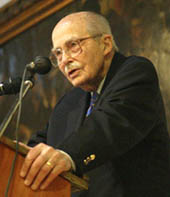
Otto Habsburg speaks (2006)
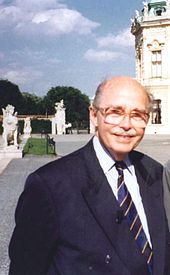
Otto Habsburg in front of the Belvedere Palace in Vienna (1998)
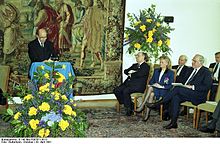
Otto von Habsburg at the presentation of the Coudenhove-Kalergi Prize to Helmut Kohl (1991)
Search within the encyclopedia

